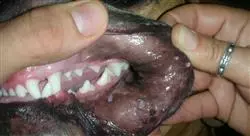University certificate
The world's largest faculty of veterinary medicine”
Introduction to the Program
You will learn to analyze the most frequent clinical signs of the most common viral diseases in small animals”

Vector-borne diseases, i.e., hematophagous arthropods, are a group of different entities produced by bacteria, viruses, protozoa and helminths. They are considered emerging (and sometimes non-emerging) in daily canine clinical practice. These diseases produce a great diversity of clinical pictures, they can be asymptomatic or can cause the death of the animal. Infectious diseases caused by parasites (Nematodes, Protozoa, Trematodes and Cestodes) are frequent in dogs, generally with gastrointestinal symptoms; the group of pulmonary parasites produces emerging pathologies in the patient.
Enterobacteriaceae are another cause of gastrointestinal diseases in the dog that include zoonotic bacteria of potential risk to the patient. To a lesser degree, within the differential diagnoses, some species of algae also generate chronic conditions that affect the digestive system of dogs. Viral diseases in the feline species are often difficult for the small animal veterinarian to deal with. Some diseases present typical clinical signs, while others have different manifestations and present pictures similar to other pathologies or even neoplasms.
Due to the particularities of the cat, there are certain differences in the approach with respect to the dog, such as specific bacteria of the feline species and typical bacterial and fungal clinical pictures. Among the parasites affecting the feline species, the clinic is always more familiar with those most frequently diagnosed and most prevalent.
For all these reasons, the interest in this field has been increasing in recent years, which is why TECH offers this 100% online program, designed by experts in Small Animal Infectious Diseases, through only 12 months of specialization, 100% online and tailor-made by experts in Small Animal Infectious Diseases. Graduates are, therefore, guaranteed an academic experience that can be perfectly combined with any other work activity, which will allow them to update and perfect their professional skills in a guaranteed manner.
An educational program based on the best working methods of the online educational panorama, revolutionary in the veterinary field”
This Professional master’s degree in Infectious Diseases in Small Animals contains the most complete and up-to-date scientific program on the market. Its most notable features are:
- The latest technology in online teaching software
- A highly visual teaching system, supported by graphic and schematic contents that are easy to assimilate and understand
- Practical cases presented by practising experts
- State-of-the-art interactive video systems
- Teaching supported by telepractice
- Continuous updating and recycling systems
- Autonomous learning: full compatibility with other occupations
- Practical exercises for self-evaluation and learning verification
- Support groups and educational synergies: questions to the expert, debate and knowledge forums
- Communication with the teacher and individual reflection work
- Content that is accessible from any fixed or portable device with an Internet connection
- Supplementary documentation databases are permanently available, even after the program
Each and every area of knowledge needed regarding Infectious Diseases in Small Animals, clearly, comprehensively and effectively presented”
Its teaching staff includes professionals belonging to the field of Veterinary Medicine, who bring to this educational program the experience of their work, as well as renowned specialists from reference societies and prestigious universities.
Theultimerdia content, developed with the latest educational technology, will provide the professional with situated and contextual learning, i.e., a simulated environment that will provide immersive learning programmed to study in real situations.
This program is designed around Problem-Based Learning, whereby the professional must try to solve the different professional practice situations that arise throughout the program. For this purpose, the professional will be assisted by an innovative interactive video system created by renowned and experienced psychology experts.
High-impact program that will give you the qualifications you need to act as an expert in this field of work"

Fully compatible with your daily life activities, it will allow you to learn in a constant and gradual way, at your own pace, without losing educational effectiveness"
Why study at TECH?
TECH is the world’s largest online university. With an impressive catalog of more than 14,000 university programs available in 11 languages, it is positioned as a leader in employability, with a 99% job placement rate. In addition, it relies on an enormous faculty of more than 6,000 professors of the highest international renown.

Study at the world's largest online university and guarantee your professional success. The future starts at TECH”
The world’s best online university according to FORBES
The prestigious Forbes magazine, specialized in business and finance, has highlighted TECH as “the world's best online university” This is what they have recently stated in an article in their digital edition in which they echo the success story of this institution, “thanks to the academic offer it provides, the selection of its teaching staff, and an innovative learning method aimed at educating the professionals of the future”
A revolutionary study method, a cutting-edge faculty and a practical focus: the key to TECH's success.
The most complete study plans on the university scene
TECH offers the most complete study plans on the university scene, with syllabuses that cover fundamental concepts and, at the same time, the main scientific advances in their specific scientific areas. In addition, these programs are continuously being updated to guarantee students the academic vanguard and the most in-demand professional skills. In this way, the university's qualifications provide its graduates with a significant advantage to propel their careers to success.
TECH offers the most comprehensive and intensive study plans on the current university scene.
A world-class teaching staff
TECH's teaching staff is made up of more than 6,000 professors with the highest international recognition. Professors, researchers and top executives of multinational companies, including Isaiah Covington, performance coach of the Boston Celtics; Magda Romanska, principal investigator at Harvard MetaLAB; Ignacio Wistumba, chairman of the department of translational molecular pathology at MD Anderson Cancer Center; and D.W. Pine, creative director of TIME magazine, among others.
Internationally renowned experts, specialized in different branches of Health, Technology, Communication and Business, form part of the TECH faculty.
A unique learning method
TECH is the first university to use Relearning in all its programs. It is the best online learning methodology, accredited with international teaching quality certifications, provided by prestigious educational agencies. In addition, this disruptive educational model is complemented with the “Case Method”, thereby setting up a unique online teaching strategy. Innovative teaching resources are also implemented, including detailed videos, infographics and interactive summaries.
TECH combines Relearning and the Case Method in all its university programs to guarantee excellent theoretical and practical learning, studying whenever and wherever you want.
The world's largest online university
TECH is the world’s largest online university. We are the largest educational institution, with the best and widest online educational catalog, one hundred percent online and covering the vast majority of areas of knowledge. We offer a large selection of our own degrees and accredited online undergraduate and postgraduate degrees. In total, more than 14,000 university degrees, in eleven different languages, make us the largest educational largest in the world.
TECH has the world's most extensive catalog of academic and official programs, available in more than 11 languages.
Google Premier Partner
The American technology giant has awarded TECH the Google Google Premier Partner badge. This award, which is only available to 3% of the world's companies, highlights the efficient, flexible and tailored experience that this university provides to students. The recognition as a Google Premier Partner not only accredits the maximum rigor, performance and investment in TECH's digital infrastructures, but also places this university as one of the world's leading technology companies.
Google has positioned TECH in the top 3% of the world's most important technology companies by awarding it its Google Premier Partner badge.
The official online university of the NBA
TECH is the official online university of the NBA. Thanks to our agreement with the biggest league in basketball, we offer our students exclusive university programs, as well as a wide variety of educational resources focused on the business of the league and other areas of the sports industry. Each program is made up of a uniquely designed syllabus and features exceptional guest hosts: professionals with a distinguished sports background who will offer their expertise on the most relevant topics.
TECH has been selected by the NBA, the world's top basketball league, as its official online university.
The top-rated university by its students
Students have positioned TECH as the world's top-rated university on the main review websites, with a highest rating of 4.9 out of 5, obtained from more than 1,000 reviews. These results consolidate TECH as the benchmark university institution at an international level, reflecting the excellence and positive impact of its educational model.” reflecting the excellence and positive impact of its educational model.”
TECH is the world’s top-rated university by its students.
Leaders in employability
TECH has managed to become the leading university in employability. 99% of its students obtain jobs in the academic field they have studied, within one year of completing any of the university's programs. A similar number achieve immediate career enhancement. All this thanks to a study methodology that bases its effectiveness on the acquisition of practical skills, which are absolutely necessary for professional development.
99% of TECH graduates find a job within a year of completing their studies.
Professional Master's Degree in Infectious Diseases in Small Animals
.
It is not possible to talk about sick animals without taking into account the concept of ""pathogens"" that allows infections such as rabies to be a viral phenomenon. Only a deepening of this pathological universe allows the veterinarian to provide an optimal anamnesis, as well as high quality pharmacological and therapeutic treatments. Betting on a necessary update in this field, TECH Global University presents the Professional Master's Degree in Infectious Diseases in Small Animals. Through an excellent online training aimed at improving the practice, the student will be able to internalize epidemiological knowledge and laboratory diagnosis, as well as different types of viral, parasitic, bacterial and fungal diseases in canine and feline species. Thanks to our self-paced classroom system enhanced with the Relearning learning model (a leader in prestigious higher education), state-of-the-art digital content and case-based tutorials by experts, you will have the opportunity to take your veterinary career to the next level, enhancing your career opportunities.
The best veterinary postgraduate degree in infectious diseases
.
Our Professional Master's Degree will give you a detailed understanding of a range of infectious agents that attack small animals, as well as the diagnostic and procedural guidelines to counteract them. Canine herpes, kennel cough, influenza, anaplasmosis, gastrointestinal parasitosis, Feline Immunodeficiency Virus (FIV), rabies in cats. These are some of the topics you will see throughout the course, as well as the pathogenesis and ethological agents involved in each of the diseases. Even two large blocks cover zoonosis and vaccination. Only TECH provides you with a professionalization offer so complete and flexible that you can manage your own schedule by accessing it on the device of your choice. Do you want to transform your future in an easy but efficient way? Opt to study at the best online university in the world.







